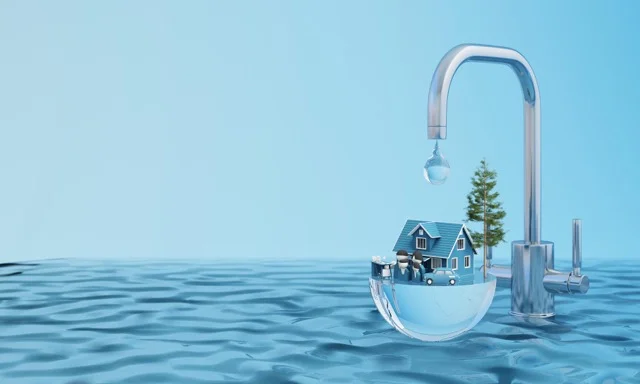How Reclaim Waste can Save You Time, Stress, and Money.
Table of ContentsReclaim Waste Things To Know Before You Get ThisSee This Report on Reclaim WasteWhat Does Reclaim Waste Mean?The Basic Principles Of Reclaim Waste 3 Simple Techniques For Reclaim Waste
Explore the kinds, incidents, and forms of fluid waste. Domestic sewage waste describes the waste and products from a domestic septic system. This kind of waste is created by human beings in houses, schools, and various other structures. This only consists of septic systems that have a drain area. The proper administration and disposal of domestic sewage waste need fluid waste to be transferred to a sewer treatment plant where the proper techniques and devices are used to cleanse and take care of waste.
Industrial waste commonly includes prospective threats, such as combustible materials or a combination of liquid and solid waste products, and needs an advanced and comprehensive disposal procedure. The disposal of industrial waste commonly entails the purification of waste before transportation to guarantee secure and proper disposal. Industrial waste is developed from byproducts and overflow of commercial procedures and production.
This type of waste can not make use of the same sewage administration transport or processes as septic or industrial liquids. The hazardous waste management process requires the examination and testing of liquid waste before it undertakes the disposal process (liquid waste removal). Runoff waste is the fluid waste that comes from runoff and excess stormwater in very booming locations or cities
Runoff waste can create contamination and flooding otherwise managed properly. Discover more concerning sewage system cleansing and waste monitoring. Making sure appropriate waste management can protect against calamities and lower ecological harm. Both people in household setups and professionals in business or manufacturing sectors can gain from recognizing the procedures and guidelines of fluid waste administration.
Things about Reclaim Waste
Call PROS Services today to discover our waste administration and disposal services and the proper methods to care for the fluid waste you create.
(https://reclaimwaste1.carrd.co/)Do you recognize what happens to your water when you pull the plug, purge the bathroom or drain the washing equipment? No? Well, it deserves understanding. This so-called 'wastewater' is not just a vital resource yet, after treatment, will be released to our land, rivers or the ocean. Made use of water from commodes, showers, baths, kitchen sinks, washings and industrial processes is recognized as wastewater.

water utilized to cool down machinery or tidy plant and devices). Stormwater, a type of wastewater, is runoff that moves from agricultural and city locations such as roof coverings, parks, gardens, roadways, courses and gutters right into stormwater drains pipes, after rain. Stormwater streams neglected straight to local creeks or rivers, at some point reaching the sea.
Some Known Questions About Reclaim Waste.
In Queensland, a lot of wastewater is treated at sewer treatment plants. Wastewater is transported from domestic or commercial websites via a system of drains and pump terminals, referred to as sewerage reticulation, to a sewage therapy plant. City governments construct, maintain and operate most sewage treatment plants. Operators are licensed under the Environmental Security Act 1994 to discharge treated wastewater at an appropriate environmental standard right into rivers.
The Division of Natural Resources recommends regional governments about managing, operating and preserving sewerage systems and treatment plants. In unsewered areas, regional governments might require householders to install individual or house sewage treatment systems to deal with residential wastewater from commodes, kitchen areas, washrooms and washings. The Division of Natural Resources authorises using household systems when they are shown to be efficient.
In some brand-new class, therapy of some stormwater to get rid of litter, sand and gravel has started utilizing gross contaminant traps. Wastewater therapy happens in four phases: Eliminates strong issue.
Wastewater after that streams right into big tanks where solids clear up and are removed as sludge. Oil and residue are skimmed from his comment is here the surface. Makes use of tiny living organisms recognizes as micro-organisms to break down and get rid of continuing to be dissolved wastes and great particles. Micro-organisms and wastes are included in the sludge. Eliminates nitrogen and phosphorus nutrients that can cause algal blossoms in our waterways and intimidate aquatic life.
The Buzz on Reclaim Waste
Nutrient elimination is not offered in any way sewer therapy plants due to the fact that it calls for pricey specialized equipment. It is becoming much more common in Queensland. Clear liquid effluent created after treatment may still include disease-causing micro-organisms. If this effluent is released into rivers such as rivers or the sea, the micro-organisms will eventually die out.

A lot of wastewater flows right into the sewerage system. Under the Act, regional federal governments carry out approvals and permits for ecologically relevant tasks (ERAs) including wastewater releases that may have a local impact.
Reclaim Waste Things To Know Before You Get This
Or else, samples are taken for lab analysis. Usually numerous examinations are needed to establish the levels of each of the various toxins such as oils, heavy steels and chemicals in water. Monitoring supplies accurate details regarding water top quality and can confirm that licence problems are being satisfied. The details obtained with monitoring gives the basis for making water quality decisions.